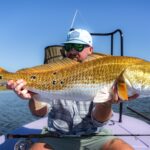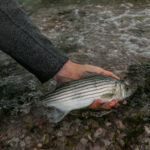
Louisiana Bull Reds Up for Harvest Again: H.B. 604 Must Not Pass
Photo Credit: Carter Abramson | Trevor Johnson Every now and then, we encounter something so
Consistent spawning production is paramount to a fishery’s long-term health. Many environmental factors are suspected to impact annual spawning production, and understanding these effects is crucial for conserving this fishery. For Atlantic striped bass, the right conditions are linked to high flows, a cool spring and a moderate temperature rise through the season, but these three factors only don’t tell the whole story.
In the latest episode of The Guide Post Podcast, ASGA’s Policy Director Tony Friedrich is joined by Martin Gary, Director of the Division of Marine Resources for New York DEP. Marty’s previous fisheries experience includes time with PRFC and Maryland DNR. While the Chesapeake community dearly misses his four decades of experience and leadership, Marty has seen the best and worst of this fishery and will play a critical role in its future up in New York.
In Episode 141, Marty and Tony discuss the environmental factors contributing to annual spawning success, including context from collaboration with renowned striper scientists and an anxious outlook for 2024. Gary expressed his concerns about the five consecutive poor spawns for stripers in the significant production zones: “At least in the management community, which I live in, and the conservation community, which you live in, I think that’s the number one concern. What does this chasm of age, this dearth of poor year classes consecutively mean? The five lowest consecutive geometric means in a time series going back to 1975. It was as bad as any five consecutive years in the 80s were. I don’t think you can find five that are lower. So, we don’t know exactly what it means, but I don’t think it means anything good. We’ll see soon enough, right?”
Along with the rest of the striped bass conservation community, Marty is anxiously waiting to see how environmental factors play out through the end of the spring and what the seine hauls record later this summer.
“We have five poor recruitment years in a row. The [2018 year class fish] are our youngest dominant year class left, our strong year class. And we’re in 2024, so those animals are six years old going into the summer. I’m anxious to see what we find in the Chesapeake because the 2017s should be gone. And the 2018s, that other strong year class, there might be a few there, but they’re probably starting to get out of there, too. So, I’m anxious to see the availability of those fish to that resident fishery this year, if that makes sense.”
Even with the lingering grey cloud of spawning production hanging over this incredibly important fishery, Marty chooses to pair his wealth of experience working on striped bass with a small dose of optimism for the future. “Great opportunities are born out of great challenges, and we sure have one to deal with right now. Let’s keep our fingers crossed. We can make things better. Sometimes, when you’re in the most dire straits, you have the best chance to elicit positive change. That’s what we’re hoping for.”
You can learn more about striped bass spawning and listen to honest management discussions in the full episode, which is available on Apple Podcasts and Spotify.
EP141: Striped Bass Spawn Dynamics with Marty Gary is live now.

Photo Credit: Carter Abramson | Trevor Johnson Every now and then, we encounter something so

This past weekend, ASGA proudly sponsored the Dirty Carp Tournament in Louisiana — and no, you didn’t misread that.

After years of data pouring in from The Albie Project, advocacy, persistence, and support from

This morning, the Connecticut Environment Committee held a hearing on House Bill 6248, a bill
We rely on our members and donations to keep fighting for a sustainable tomorrow in marine conservation.
GIVE THE GIFT OF FISHERIES CONSERVATION THIS HOLIDAY SEASON. SHOP ASGA GOODS THAT FUND FISHERIES RESEARCH & ADVOCACY CAMPAIGNS
JOIN ASGA IN CALLING FOR CRITICAL MANAGEMENT ACTION AFTER YEARS OF SPAWN FAILURES & POOR MANAGEMENT.
By using this website, you agree to our use of cookies. We use cookies to provide you with a great experience and to help our website run effectively. To learn more, please review our privacy policy.